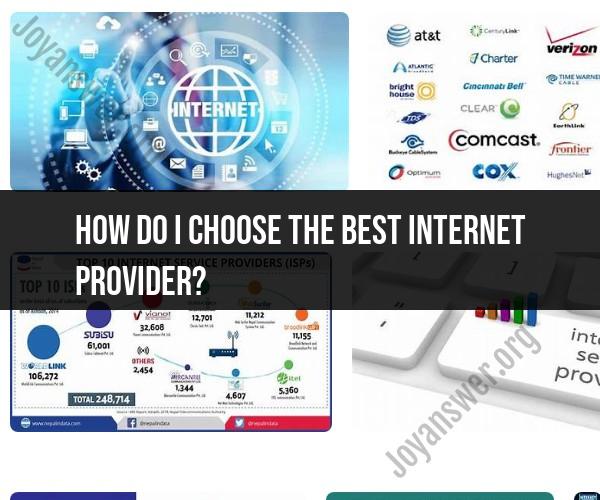How do I choose the best internet provider?
Choosing the right internet service provider (ISP) is a crucial decision, as it can significantly impact your online experience. Here's a comprehensive guide to help you select the best internet provider for your needs:
1. Determine Your Needs:
- Start by understanding your internet needs. Consider factors like the number of connected devices, usage patterns (streaming, gaming, work, etc.), and the internet speed required for a seamless experience.
2. Types of Internet Connections:
- Different ISPs offer various types of internet connections. Common options include DSL, cable, fiber-optic, satellite, and fixed wireless. Research which types are available in your area and which one best suits your needs.
3. Availability and Coverage:
- Check which ISPs operate in your area. Some ISPs are region-specific, and not all services are available everywhere. Verify that the providers you're interested in serve your location.
4. Compare Plans and Pricing:
- Compare the plans offered by different ISPs in your area. Pay attention to factors like speed, data caps, contract terms, and monthly costs. Also, consider any promotional pricing and its duration.
5. Speed Requirements:
- Ensure the internet speed offered matches your requirements. If you're a heavy internet user or have multiple users in your household, you may need faster speeds. Most providers offer a range of speed tiers.
6. Data Caps:
- Be aware of any data caps or usage limits imposed by the ISP. Some plans may limit your monthly data usage, which could result in extra charges if exceeded.
7. Reliability and Performance:
- Research the reputation of the ISP for reliability and performance. Online reviews and feedback from local customers can provide insights into the quality of service.
8. Customer Support and Service Quality:
- Consider the quality of customer support and technical assistance. Read reviews and check if the ISP offers 24/7 customer support.
9. Contract Terms and Fees:
- Carefully read the terms and conditions of the service agreement. Pay attention to contract lengths, early termination fees, installation costs, and equipment fees.
10. Bundled Services:
- Some ISPs offer bundled services that include internet, TV, and phone. If you need multiple services, bundling may save you money.
11. Equipment:
- Inquire about the equipment provided by the ISP. Some ISPs offer modem and router rentals, while others require you to purchase your own equipment. Make sure it's compatible with the service.
12. Speed Consistency:
- Ask if the ISP guarantees consistent speeds during peak usage hours. Some ISPs may experience slower speeds during busy times.
13. Extras and Features:
- Check for any extra features or services included with the internet package, such as antivirus software or free Wi-Fi hotspot access.
14. Testimonials and Recommendations:
- Seek recommendations from friends, family, or neighbors who use the same ISP. Hearing about their experiences can be valuable.
15. Research ISPs' Local Service:
- Consider smaller, local ISPs in your area, as they may offer competitive options with personalized customer service.
16. ISPs' Transparency and Privacy Policies:
- Review the ISP's privacy policies and data usage practices, particularly if you have concerns about data privacy.
17. Contract Flexibility:
- Check if the ISP offers contract-free or month-to-month plans, which provide more flexibility.
18. ISP's Future Plans and Upgrades:
- Inquire about the ISP's plans for future upgrades and technology improvements to ensure your internet service remains up-to-date.
By considering these factors and conducting thorough research, you can make an informed decision when choosing the best internet provider for your specific needs and location. Keep in mind that your choice of ISP can greatly affect your online experience, so take your time to select the provider that offers the best combination of service quality, pricing, and support.
Choosing the Best Internet Provider: A Consumer's Guide
Choosing the best internet provider is an important decision for any consumer. With so many different providers and plans to choose from, it can be difficult to know where to start. This guide will help you understand the key factors to consider when selecting an internet provider, how to research and compare your options, and how to make an informed decision for your needs.
Key Factors to Consider When Selecting an Internet Provider
When choosing an internet provider, there are a few key factors to consider:
- Speed and bandwidth: How fast do you need your internet to be? How much bandwidth do you need to support your online activities?
- Availability: Is the provider available in your area?
- Price: How much are you willing to pay for internet service?
- Customer service: Does the provider have a good reputation for customer service?
- Additional features: Does the provider offer any additional features that are important to you, such as TV streaming or voice service?
Researching and Comparing Internet Service Options
Once you have considered your key factors, it's time to start researching and comparing internet service options. You can do this by visiting the websites of different providers or by using a comparison website.
When comparing plans, be sure to pay attention to the following:
- Speed and bandwidth: What are the advertised speeds and bandwidth for each plan? Keep in mind that these are advertised speeds, and your actual speeds may vary.
- Data caps: Do any of the plans have data caps? If so, how much data are you allowed to use each month?
- Pricing: What is the monthly price for each plan? Are there any additional fees, such as installation or equipment fees?
- Contract terms: Are there any contracts associated with the plans? If so, what are the terms and conditions?
Ensuring Reliable and High-Quality Internet Connectivity
When choosing an internet provider, it's important to ensure that you will be getting reliable and high-quality internet connectivity. You can do this by reading online reviews of different providers and by talking to your friends and neighbors about their experiences.
You should also ask the provider about their network performance and uptime. Network performance refers to the speed and reliability of the provider's network. Uptime refers to the percentage of time that the provider's network is up and running.
Making Informed Decisions for Your Internet Needs
Once you have researched and compared different internet service options, you're ready to make an informed decision for your needs. Consider your budget, your needs for speed and bandwidth, and the reliability of the provider when making your decision.
It's also important to read the fine print of any contract before signing up for an internet service plan. This will help you understand the terms and conditions of the plan, including any cancellation fees or early termination fees.
By following these tips, you can choose the best internet provider for your needs and get the service that you deserve.













